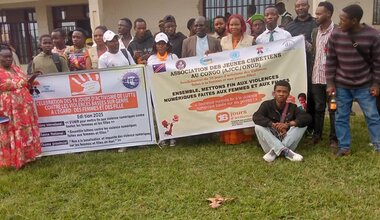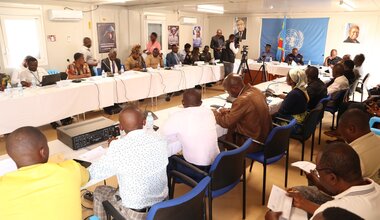MONUSCO supports the establishment of two new pacification committees
Kabéké, Manono Territory – Tanganyika province, 24 March 2016 - Under the supervision of the head of MONUSCO office in Kalemie, and in partnership with the local security authorities and civil society representatives, the process of establishing joint reconciliation committees continues in Manono territory with the goal of ending the intercommunal conflict between Pygmies and Bantous.
Under this process, commonly known as Baraza, MONUSCO on 24 March 2016 facilitated the setting up of two new pacification and reconciliation committees: one in the area of Kabéké, located 178 km from Manono, and the other in Nsengatshimbu, another cluster of villages that had also suffered the consequences of the intercommunal Pygmy-Luba conflict.
As was the case with the previously established committees, the ceremony took place in the village square in front of a large crowd of men, women and children. The two new committees, each comprising fourteen members, were officially installed and invested with the mission to maintain, in their respective regions, dialogue and peaceful coexistence between the two communities; resolve differences by mutual agreement; and alert, if necessary, the administrative and social partners that accompany the Baraza process.
Aware of their roles, the committee members, comprising equal numbers of Pygmies and Bantous, committed themselves to fulfill their mission by working not only to maintain social cohesion but also to raise awareness among the most skeptical segments of the population, those who do not know that « the war is now over”, as the Pygmy chief said during the “peace tree” planting ceremony. This was followed by a warm handshake between the latter and the chief of the Luba villages of Kabéké, accompanied by enthusiastic applause from those present.
In addition, the creation of the Baraza committee was an opportunity to reaffirm State authority. In Kabéké, local administration officials, security forces (FARDC and Congolese National Police) exchanged directly with members of the population on security issues in the region and explored possible solutions. The population brought to the attention of the territorial authority the difficulties they face in Kabéké in terms of access to health care or access to education for children.
In the space of six months, with the support of the office of MONUSCO-Kalemie, five pacification and reconciliation committees have thus been set up in the northeastern part of Manono territory, a region until recently plagued by violence linked to the intercommunal Pygmy-Luba conflict. The following five localities of Tanganyika province are where these committees are in place: Mukebo, Mbayo, Sangé, Kabéké and Nsengatshimbu.
 UN
UN United Nations Peacekeeping
United Nations Peacekeeping






